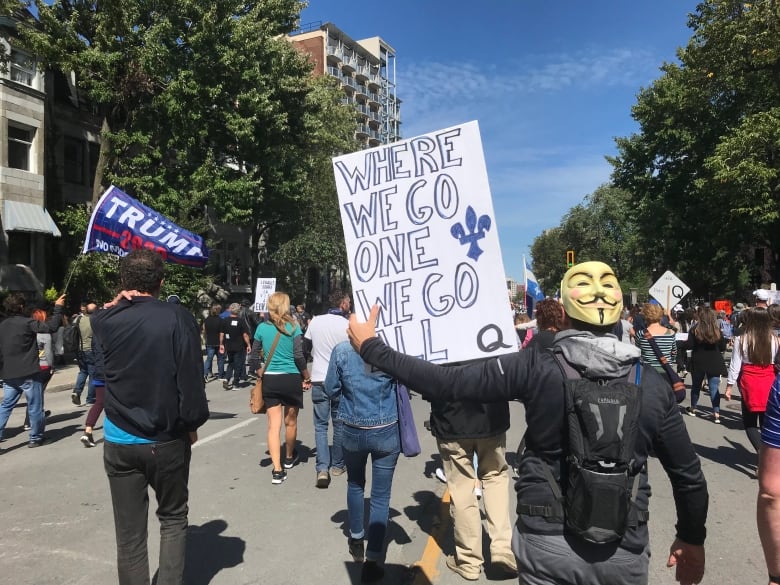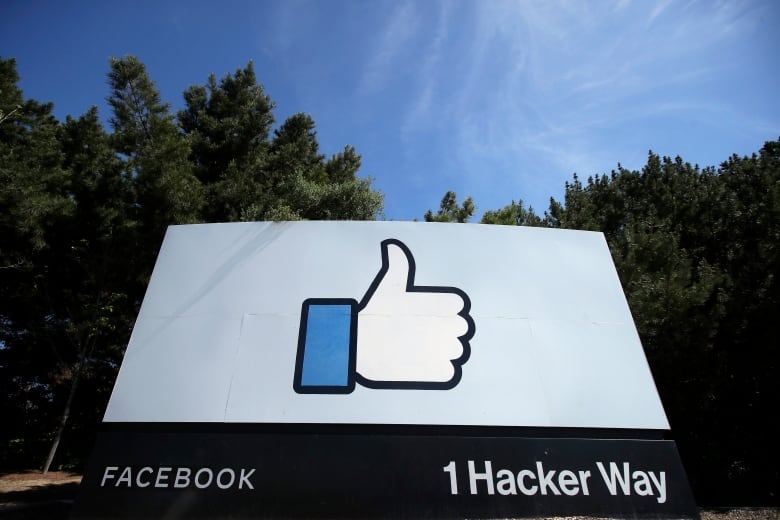Facebook removes popular Quebec conspiracy theorist as part of campaign against QAnon
One of Quebec’s most prominent advocates of the QAnon conspiracy movement, which spreads falsehoods about COVID-19, has been kicked off Facebook.
The page belonging to Radio-Québec, a media outlet with 77,000 followers on Facebook, was taken down on Wednesday, Facebook Canada said.
The move follows Tuesday’s announcement that Facebook would remove any group or page that openly identifies with QAnon.
That marked a significant escalation of Facebook’s existing policies aimed at limiting the influence of a movement that U.S. law enforcement considers a national security risk.
After the new guidelines were released by Facebook on Tuesday afternoon, senior officials at the company’s Canadian offices discussed whether they should be applied to Radio-Québec, according to sources familiar with the matter.

“We’re now removing Pages, Groups and Instagram accounts representing QAnon including Radio-Québec,” Facebook Canada said in a statement provided to CBC Montreal on Wednesday.
“It will take time to enforce this policy and we will be prioritizing this work over the coming days and weeks.”
Following jumped during the pandemic
Radio-Québec is a collection of hour-long videos by Alexis Cossette-Trudel, a 47-year-old Montreal man with past ties to Quebec’s far-right.
The media outlet gained a small following by translating into French QAnon’s groundless claims about a secret cabal of child-sex traffickers that control world events.
Since March, Cossette-Trudel’s videos have focused almost exclusively on COVID-19 and the pandemic. Like many QAnon followers, he believes the dangers of the disease are being exaggerated as part of a plot to undermine U.S. President Donald Trump.

He repeatedly questions the need for widespread public health measures and considers Quebec Premier François Legault to be part of the plot against Trump.
His following — both on Facebook and YouTube, where his channel has 120,000 subscribers — jumped dramatically during the pandemic.
He has become a leading figure in the movement to protest Quebec’s public health rules, which include wearing a mask in stores and on public transit.
Cossette-Trudel has spoken at several anti-mask demonstrations. He also has made appearances on CHOI FM, a Quebec City radio station whose on-air personalities are vocal opponents of the mask rules.
Facebook had recently taken steps to limit Radio-Québec’s influence, including removing Cossette-Trudel’s ability to make money from the page and restricting when it appeared in search results.
In an interview Tuesday, before his Facebook account was removed, Cossette-Trudel said the restrictions amounted to “censorship” and accused Facebook of being a “guard dog of the powerful.”
He said he had stopped making direct references to QAnon several months ago and has never advocated violence.
In the interview he made it clear he continues to believe in the accuracy of the statements made by Q, the supposed figure in the U.S. government who has knowledge of the various plots against Trump.
Expert says conspiracies raise public health issues
This is one of the first instances where Facebook has publicly acknowledged taking action against extremist content in Quebec.
Other far-right groups in the province — including the Islamophobic La Meute, anti-immigrant Storm Alliance and neo-fascist Atalante — have all been allowed to operate pages for several years. And this despite Facebook having kicked off similar far-right groups in the rest of Canada, such as Soldiers of Odin and Proud Boys.
Samuel Tanner, a criminology professor at the Université de Montréal, said many of the older far-right groups in Quebec have become adept at moderating content to avoid Facebook’s censors.
But, he added, the public health issues at stake in a pandemic have altered the political context of what Facebook can consider acceptable.
“Saying COVID-19 is not serious, it’s just a cold, it doesn’t exist, et cetera — that’s dangerous at moments like this,” said Tanner, who studies far-right groups in Quebec.
“Facebook is an important source of information for people and these kinds of statements can be dangerous to public health.”
*** This article has been archived for your research. The original version from CBC.ca can be found here ***


